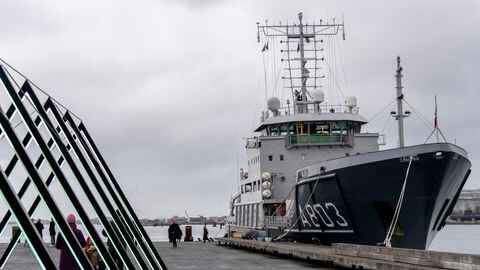The newspaper Expressen was informed by the Swedish Coast Guard that they were present close to the ship, which the tabloid named the Malta-flagged Vezhen, which was anchored close to the Karlskrona harbor.
In addition to ordering the detention of a yacht in the Baltic Sea suspected of causing damage to an underwater fiber optic cable between Latvia and the Swedish island of Gotland, Swedish prosecutors have revealed that they have launched a preliminary investigation into suspected aggravated “sabotage.”
Mats Ljungqvist, senior prosecutor at the National Security Unit, stated in a news release on Sunday night that “a number of authorities, including the National Police Operations Department, the Coast Guard, and the Armed Forces, are involved in the investigation.”
The newspaper Expressen was informed by the Swedish Coast Guard that they were present close to the ship, which the tabloid named the Malta-flagged Vezhen, which was anchored close to the Karlskrona harbor.
Coast Guard spokeswoman Mattias Lindholm stated, “We are directly on site with the seized ship and are taking measures as decided by the prosecutor.”
Vesselfinder data indicates that the ship had left the Russian port of Ust-Luga a few days prior and was traveling between Gotland and Latvia when the damage was thought to have happened.
The state-run radio and television center in Latvia said on Sunday that it had detected data transmission problems on the cable that connects the Swedish island of Gotland to the town of Ventspils and came to the conclusion that there had been a rupture.
“External factors”
The media outlet claimed that while it was working to have the cable fixed, it could continue to function via alternative data transmission channels.
The LSM state broadcaster cited Vineta Sprugaine, head of corporate communications at LVRTC, as saying, “At this time, there is reason to believe that the cable is significantly damaged and that the damage is caused by external influences.”
Latvia’s government was “working together with our Swedish Allies and NATO on investigating the incident, including to patrol the area, as well as inspect the vessels that were in the area,” according to a post on X by Prime Minister Evika Siliņa.
Ulf Kristersson, the prime minister of Sweden, stated on X that he has been “in close contact” with Siliņa throughout the day on Sunday and that at least one cable that belonged to a “Latvian entity” was thought to have been damaged.
The breakup on Sunday comes after a series of events that have raised concerns about Russian espionage and sabotage in the key area. Data cables that run on the Baltic Sea bed have ruptured in the past, according to reports.
In order to provide “enhanced surveillance and deterrence” in the Baltic Sea—which the transatlantic alliance claims is to safeguard underwater cables and pipelines—NATO launched a new mission earlier this month called “Baltic Sentry,” which includes frigates, maritime patrol planes, and a fleet of naval drones.






